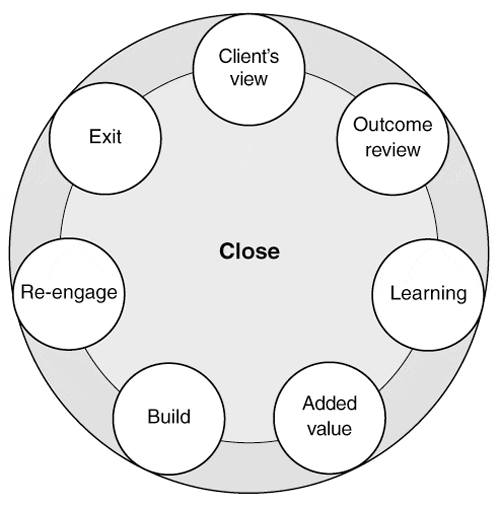Chapter 12. Stage seven: Close

This is not the end.
It is not even the beginning of the end; but it is perhaps the end of the beginning.
—Winston Churchill
So the contract is over, it is time to say goodbye and move on to the next client. But like watching a good play or tasting a fine wine, it is that last memory that will remain and which may cloud the recollection of the total experience. As any psychology student will explain, the 'recency' factor means that the last items presented are more likely to be recalled than those that went earlier. As such it is important for you to carefully manage the exit and not just assume that it will be OK to ask for the money and leave.
Failure to stage-manage the closure process has led and will continue to lead to many disasters:
Consultants were convinced that since the project action had been completed no formal review was necessary with the client. Although they were paid, no further contracts were offered because the client felt that they had not been prepared to listen to his view of the outcomes.
Although the board was happy with the new processes that a consultant had helped to deliver, they were starting to question the real value of the change. They believed that they could have made the change themselves and so saved substantial amounts of money. The problem was that the consultant focused on telling the board what had been delivered. If he had communicated how the company had changed as a result, they might have understood that there were elements that they could not have delivered themselves.
A consultant had finished a great piece of work and the client and consumer were happy and keen to build on the work. However, the consultant was relatively new to the consulting world and felt that she should not be trying to sell on the back of success. She believed that if the client wanted some further work they would indicate that as part of the relationship. The end result was that both parties spilt with an unspoken desire to work together again and hence there was a lost opportunity.
A consultant closed his project down and left to work on another project. But many parts of the client's organization had built a close working relationship with the consultant and tended to call on him for advice on many of the core issues within the project. His departure meant that people felt slightly let down and were not keen to make use of his services again.
So, in closing an engagement, I suggest that you must avoid the entirely natural urge to say goodbye with a cheery wave on the assumption that everything will be all right because the project outcomes have been achieved. There are many tangible and intangible issues that need to be addressed at this stage and you must work with the client to ensure that time is made available for the closure process.
Within this stage of the cycle, the following issues need to be considered:
Client's view: Encourage the client to reflect on their view of the world before presenting your view of the outcomes.
Outcome review: Work with the client to use all of the available data (objective and subjective) to determine the success of the programme.
Learning: Encourage your client to consider what has been learned over and above the planned outcomes of the change.
Added value: Where applicable, it is important to understand how the outcomes from the change have tangibly delivered improvement to the operational or commercial viability of the organization.
Build: On the assumption that the consultancy assignment has been handled professionally and delivered the appropriate outcomes, then it may be appropriate to investigate what opportunities might exist for further work.
Re-engage: At this stage, you will start the exit process and prepare to either leave the client or begin work on further projects.
Exit: The onus is on you to ensure that at the point of departure all unnecessary levels of dependence have gone from all sides of the relationship.
Like leaving a friend at the station or saying goodbye to someone at a club, it is the last point of meeting that will be remembered. In the same way, how you leave your client and consumer will always affect any future relationship. The danger is that once the excitement is over, you might let your guard drop and mistakes can start to occur. It is at this point that you must take the utmost care to ensure that silly mistakes do not get made and that the change finishes with style and grace rather than on a low note. On this basis it is important that all of the steps outlined in this stage are at least considered if not enacted.
